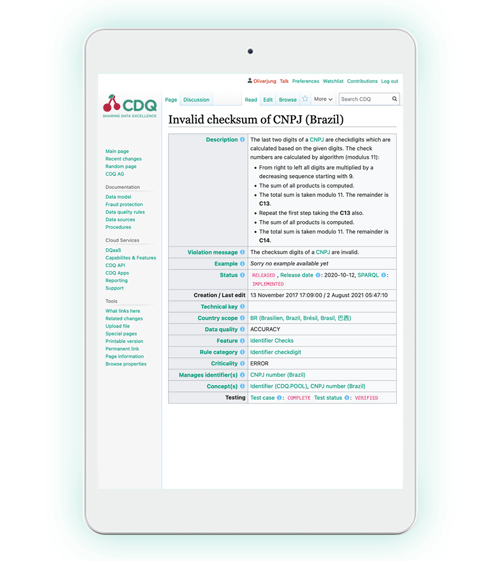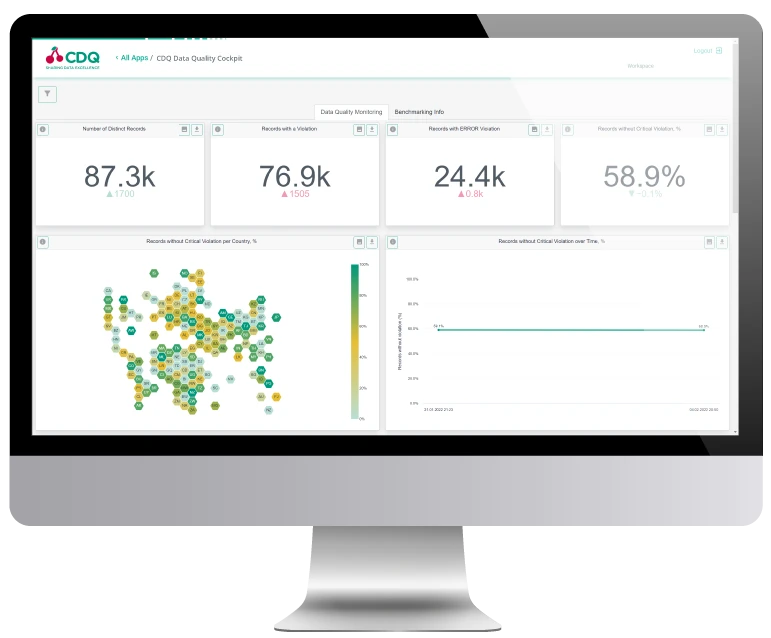Benefit from 2,500+ ready-to-use data quality rules
Stop reinventing the wheel: Over 2,500+ data quality rules within our Data Quality Solutions help you improve your customer and supplier master data while saving time and money. The algorithms enable a detailed data quality check and verify that the data records meet your specific business requirements.
In cooperation with the companies in our Data Sharing Community, we continually improve our data validation rules. This way, the effort for maintenance and development is shared, and everyone can benefit from the know-how of the fellow member companies.
What's in it for you?
Save time in developing & creating data quality rules
On average, before connecting with CDQ, our member companies used only about 30% of the approximately 2,500 data quality rules. This means that business and data management professionals spent a total of 2,275 man-hours on research, documentation, and testing alone. By using the tested, ready-to-use CDQ data quality rules, these companies now save time and effort.
Another benefit is that IT saves on implementation costs for each individual rule. These often amount to several hundred euros per rule.

Validation rules in action
To streamline the automation of master data creation while ensuring local requirements are always met, Tetra Pak developed and enforced rules tailored to address both global and local needs.
Collaboration with global experts has resulted in a comprehensive set of validation rules that not only prevent users from entering erroneous data into the system but are bridging local and global data requirements and boost data democracy for the entire organization.
Continuous savings in the maintenance of data validation rules
Our expertise and know-how help companies save money when developing and implementing new data quality rules. Our customers save annual maintenance costs that amount to about 85 man-days per year.
Read more about data quality rules
Local needs, global excellence: Tetra Pak best practice approach
In a recent showcase at the CDQ Good Practice Award ceremony, Tetra Pak, a global leader in food processing and packaging solutions, shared invaluable insights…
Even more data quality rules available out-of-the-box
At CDQ, we take data quality seriously. And at the core of our data quality journey lies the active involvement of our Data Sharing Community. We believe that…
Data quality rules: the fuel your master data management runs on
The world of data quality rules offers a fascinating journey. Mine started when I realized how bad the business partner data quality is at organizations. During…
Data quality rules: frequently asked questions (FAQ)
What are data quality rules (data validation rules)?
Data quality rules (also known as data validation rules) are, like automation rules, special forms of business rules. They clearly define the business requirements for specific data. Ideally, data validation rules should be "fit for use", i.e. appropriate for the intended purpose.
Since data quality rules can be used to check the quality of data and data records, these are the primary tools for determining data quality. By checking against the validation rules, it is possible to test whether the data meet the defined criteria and possess the required attributes. In this way, our data quality rules help detect potential weak points in processes and derive recommendations for action.
Data quality rules allow for the measurement of different data quality dimensions, such as:
- The contextual accuracy of values (correctness, accuracy)
- The consistency among values (consistency)
- The allowed format of values (representational consistency, accuracy)
- The completeness of values
Why do you need data validation rules?
Data quality rules can be used to analyze and evaluate the quality of specific data sets, i.e. to perform a data quality check. The insights gained from this, such as problem areas and recommendations for action, provide the basis for subsequent data cleansing or data enrichment. This cleansing and enrichment process includes things like the removal of duplicates or the addition of missing data elements.
The analysis and cleansing of data, such as business partner data, can be automated with the help of data quality rules; thus, saving on resources. Thanks to powerful cloud technologies, the processing of large data volumes is no longer a problem.
How does a data quality rule look?
A ready-to-use data quality rule is an algorithm that checks the structure, format, and arrangement of data and matches it with previously defined requirements. However, data validation rules are first generally conceptualized and described before developing an executable, machine-readable validation rule. The development process usually follows this scheme:
1. Documentation of the technical requirements
- Technical description of the data quality rule
- Determination of the importance/priority of the rule for company processes
- Clear overview showing dependent data elements and data quality rules
2. Translation into machine-readable format
- Development of a machine-readable validation rule
- Definition of test cases
3. Realization or implementation
The data rule should be documented in a technically oriented manner, i.e., written in the language of the specialist department so that the functionality and the requirements for the data can be understood by all those involved.
A concrete example of this would be a simple data rule that checks the postal codes in Germany within the company master data; they are only accepted as complete if their values meet the following criteria:
- The postal code may only contain numbers and no letters or special characters (Representational consistency, format rule)
- The postal code must be five integers long (Representational consistency, format rule)
- The postal code must be consistent with the specified city (consistency)
- The postal code must actually be assigned (accuracy)
What are the savings from using CDQ's data quality rules?
On average, our member companies use 30% of the approximately 2,500 data quality rules. This means that business and data management professionals spend a total of 2,275 man-hours on research, documentation and testing only. These can be saved by using the already tested ready-to-use CDQ data quality rules.
Another benefit is that IT saves on implementation costs for each individual rule. These often amount to several hundred euros per rule.
In addition, the companies save the annual maintenance costs for these rules, which amounts to about 85 man-days per year, in the following years.



